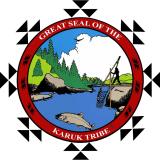Chími nukárihihi (Let’s Get Ready): Collaborative Climate Change and Drought Response Monitoring and Implementation

Through this project, the Karuk Tribe aims to improve Karuk socio-ecological resilience to drought by (a) increasing access to drought-relevant data for Karuk Tribal managers and (b) increasing Karuk community engagement in research, monitoring, and management activities to better integrate Indigenous and Western science and management systems and achieve more rapid awareness of and response to drought impacts across the landscape.
The project team will build out a drought resilience data portal to enable Karuk natural resources managers to access geospatial data in a user-friendly way. The team will also build on the previous five years of Agroecosystem Climate Assessment and Food Grove plot data collection, which has resulted in baseline data of cultural food, fiber, and medicinal plant focal species that are important for Karuk culture. With this grant the team plans to revisit the 9 existing plots and 20 focal patches and create 3 new plots for seasonal visits and harvest visits, where they will be monitoring drought impacts on cultural resources. These plots are located in areas that are within the Western Klamath Restoration Partnership (WKRP) implementation areas and/or Tribally-owned land, and thus, the team is able to make recommendations on land management based on data collected (including cultural practitioner observations).
Lastly, the team will expand its engagement of Indigenous cultural practitioners, community members, and their families in the process, in places they gather or live, to support intergenerational knowledge transfer and so that the users of the cultural plants will be part of the drought monitoring and management recommendations for WKRP.
This research was funded by NIDIS through the FY 2022 Coping with Drought Competition – Building Tribal Drought Resilience. For more information, please contact Britt Parker (britt.parker@noaa.gov) and Crystal Stiles (crystal.stiles@noaa.gov).
Research Snapshot
Analisa Tripp and Colleen Rossier, Karuk Department of Natural Resources
Jennifer Sowerwine, University of California, Berkeley
What to expect from this research
The project will strengthen socio-ecological resilience to drought by integrating Indigenous and Western science and management systems and through collaboration between Indigenous and Western scientists and managers in order to achieve faster awareness of and response to drought impacts on cultural indicator species by Karuk Department of Natural Resources managers.
This project will strive to the answer the following questions:
- How can a management and monitoring protocol (re)connect Indigenous families with their homeland ecosystems and place-based research, data, monitoring, planning, and implementation of management activities?
- How can this support greater socio-ecological resilience to drought?
The project seeks to utilize the best of both Western and Indigenous science, practice, and management by supporting both the data infrastructure and the socio-ecological infrastructure of the Karuk Tribe in order to detect, respond to, mitigate, and manage drought and its impacts in Karuk Aboriginal Territory. To do so, it is critical that we engage with and lift up Indigenous voices of the Karuk community.


